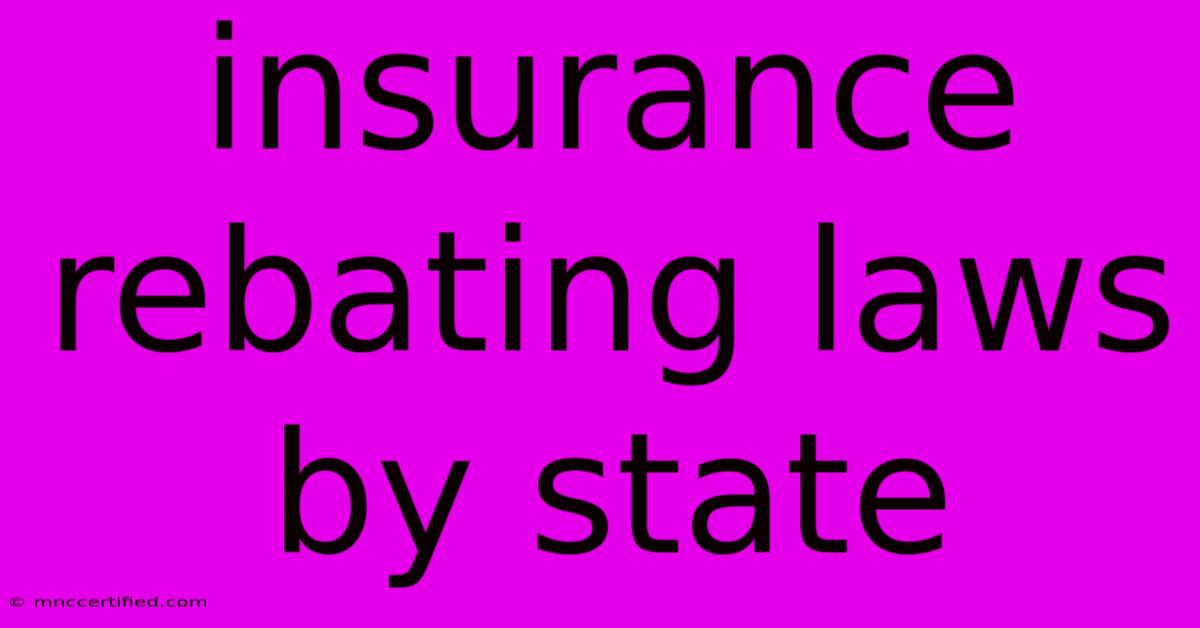Insurance Rebating Laws By State

Table of Contents
Insurance Rebating Laws by State: A Comprehensive Guide
Navigating the complex world of insurance can be challenging, and understanding the legality of rebates adds another layer of complexity. Insurance rebating laws vary significantly from state to state, making it crucial to know the specific regulations in your area. This comprehensive guide will break down insurance rebating laws by state, helping you understand what's permitted and what constitutes an illegal practice. We'll also explore the potential consequences of violating these laws.
What is Insurance Rebating?
Insurance rebating refers to offering anything of value to a potential or existing customer as an inducement to purchase insurance. This "something of value" can take many forms and isn't limited to just cash. It could include:
- Cash back: A direct refund of a portion of the premium.
- Gifts or merchandise: Items like gift cards, electronics, or other goods.
- Trips or vacations: Incentivizing purchases with travel opportunities.
- Discounts on other services: Offering reduced rates for related products or services.
- Favors or preferential treatment: Anything that gives the customer an unfair advantage.
It's important to note: Not all inducements are considered rebating. Legitimate discounts, such as multi-policy discounts or those based on good driving records, are generally permissible. The key distinction lies in whether the inducement is offered to influence the purchase decision rather than reflecting a genuine risk assessment or customer loyalty program.
Why are Insurance Rebating Laws in Place?
These laws exist to protect consumers and maintain a fair and competitive insurance market. Rebating can:
- Undermine fair competition: Insurers who offer illegal rebates gain an unfair advantage over those who don't, potentially driving honest businesses out of the market.
- Encourage purchasing decisions based on price alone: This can lead to consumers choosing inadequate coverage simply to get a better deal.
- Create a risky insurance environment: Insurers might accept higher risk clients to maintain profitability after offering rebates, leading to higher premiums for everyone in the long run.
Insurance Rebating Laws: A State-by-State Overview (Partial List)
Providing a completely exhaustive state-by-state breakdown within this format is impractical due to the length. However, we'll highlight some key states and illustrate the variations in their laws. Always consult your state's Department of Insurance website for the most up-to-date and accurate information.
- California: California has strict laws against rebating, with significant penalties for violations.
- Florida: Similar to California, Florida aggressively enforces its anti-rebating statutes.
- Texas: Texas also prohibits insurance rebating, with clear definitions of what constitutes an illegal inducement.
- New York: New York's regulations are comprehensive and cover a wide range of potential rebating scenarios.
- Illinois: Illinois's insurance department actively monitors and investigates potential rebating activity.
(Note: This is not an exhaustive list. Further research is needed for each individual state.)
Penalties for Rebating Violations
Penalties for violating insurance rebating laws vary by state but can include:
- Fines: Significant monetary penalties for both insurers and agents.
- License suspension or revocation: Loss of the ability to sell insurance.
- Criminal charges: In some cases, particularly for egregious violations, criminal charges can be filed.
- Legal action: Consumers can sue insurers or agents for damages resulting from illegal rebating practices.
How to Avoid Illegal Rebating
Both insurance companies and consumers need to be aware of these laws. Consumers should be cautious of offers that seem "too good to be true." If an offer seems suspiciously discounted, it might be an illegal rebate. Insurance professionals must adhere strictly to the legal guidelines in their state to avoid severe repercussions.
Key Takeaway: Staying informed about your state's specific insurance rebating laws is crucial. Refer to your state's Department of Insurance website for detailed information and seek legal counsel when necessary. Understanding these regulations ensures a fair and transparent insurance market for everyone.
SEO Optimization Considerations:
This article incorporates several SEO strategies:
- Keyword Optimization: Uses relevant keywords like "insurance rebating laws," "rebating laws by state," "illegal insurance rebates," "insurance rebates penalties," etc., naturally throughout the text.
- Header Structure: Uses H2 and H3 headers to improve readability and structure for search engines.
- Bold Text: Emphasizes key terms and phrases for better readability and SEO.
- Internal and External Linking (potential): While direct download links are avoided, linking to relevant state Department of Insurance websites would be beneficial (this would require additional research and link creation during the actual publishing process).
- Long-form Content: The article's length provides comprehensive information, a factor that Google favors.
This structure and keyword usage aim to improve search engine rankings and provide valuable information to readers searching for information on insurance rebating laws. Remember to conduct further research for individual state regulations and update the content accordingly.

Thank you for visiting our website wich cover about Insurance Rebating Laws By State. We hope the information provided has been useful to you. Feel free to contact us if you have any questions or need further assistance. See you next time and dont miss to bookmark.
Featured Posts
-
Jet Token Stock Price Prediction
Nov 21, 2024
-
How To Watch Cavs Vs Pelicans Nba
Nov 21, 2024
-
Rental Car Insurance New Zealand
Nov 21, 2024
-
Jaguar Rebrand Sparks Online Criticism
Nov 21, 2024
-
Suits La Welcomes Back Harvey Specter
Nov 21, 2024